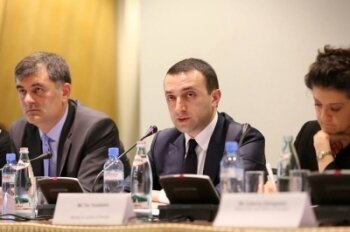COUNCIL OF EUROPE AND EU FOR PROTECTING HUMAN RIGHTS IN PRISONS
11 July, 2013
 On July 9, at the Holiday Inn, the Council of Europe with the support of the European Union launched the Joint Program “Human Rights in Prisons and Other Closed Institutions”, dedicated to protecting human rights and enhancing access to health care for the persons deprived of liberty.
On July 9, at the Holiday Inn, the Council of Europe with the support of the European Union launched the Joint Program “Human Rights in Prisons and Other Closed Institutions”, dedicated to protecting human rights and enhancing access to health care for the persons deprived of liberty.Over the period of two year, the program will deal with three main challenges for prisoners, places of detention and psychiatric facilities in Georgia: access to adequate health care, protecting human rights of persons in need of psychiatric care, and preventing and combating ill-treatment and impunity.
Catherina Bolognese, Head of the Council of Europe Office in Georgia, opened the event: “Show me how the country treats its prisoners and I will tell you how civilized the country is, - this has been said by wise people. It is a challenge in every society, including Georgia”.
The next speaker was Thomas Hammarberg, EU’s Special Advisor on Legal and Constitutional Reform and Human Rights in Georgia. He said that it’s important to take care of the health situation of the inmates in prison as well as of those people, who are arrested or being in the pre-trial detention place. He expressed a hope that Georgia will learn a lot in terms of human rights protection from its own past examples.
According to Sozar Subari, Minister of Corrections and Legal Assistance, the number of prisoners has been reduced by almost 65%, but their number is still much higher than in the European countries. “We wish to create the system in which a person will be a central figure,” he said.
Justice Minister Tea Tsulukiani also delivered a speech: “It is very important that prisoners with contagious diseases should not be placed with the healthy ones. My decision to leave the post in the Council of Europe was stipulated by numerous complaints from Georgian prisons in terms of violating human rights. Sometimes I had 40 complaints on my table. Now, as a minister, I can say that since the new government came to power, there are very few cases of Georgian prisoners that are addressed to the Strasburg Court.”
Irakli Garibashvili, Minister of Interior Affairs, noted: “The short-term development strategy has been elaborated with special emphasis on protecting human rights. Education is very important and we held tests for policemen all over the country to verify their competence.”
Ucha Nanuashvili, Public Defender of Georgia, was among the participants. “it is a fact that 653 people have died in closed institutions within 6 years and no investigation has been launched. It is the fact that 150 prisoners who were totally healthy, left prisons with physical disabilities. It is also the fact that the term ‘torture’ was ignored by the previous government, as if nothing similar existed in Georgia. This is the program in which all of us take a great interest; it will be a guarantee that we will always remember that no matter how bitter the truth is, we must face it. Here I see my predecessors who were doing their best to be helpful. But we worked in the vicious circle due to the vicious system. Therefore, we should analyze the reasons which are really simple: the syndrome of impunity reigned in the city. Therefore, it is of utmost importance that all the investigations that are going on, are completed.
The second is to create a mechanism of monitoring. Recently, over 20 experts from NGOs have been enlisted to monitor these processes”.





















































